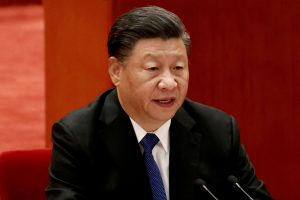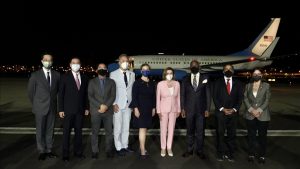
Pervasive corruption has dominated Nigeria’s political landscape for years. Just this week, the UK Government pledged to promptly return over 4.2 million pounds (N2.2b) seized from James Ibori, former Delta State Governor.
The fight against corruption is one of the resolves of the Buhari-led administration under a leader who understands the importance of a corrupt-free society to national development. Since his assumption of office of the president, Muhammadu Buhari has remained committed to ensuring that corruption in Nigeria’s political landscape is expunged. This has seen the exposure of several levels of public sector corruption over the last five years. As the fight against corruption shakes up the public sector to the point of causing officeholders to morph when probed, there are still new propositions to enhance the process.
One interesting suggestion came a few days ago. It was for President Muhammadu Buhari to sign an executive order that will give legal backing to any call for explanations from anybody living above their visible means of income. The proposal came from the Chairman Senate Committee on Army, Ali Ndume:
“President Muhammadu Buhari should sign an executive order to activate the Unexplained Wealth Order and make the work of the EFCC more efficient. The president has the right to sign an executive order. Nobody can challenge it in court.
“The president should also send a bill on the unexplained wealth order to the National Assembly to domesticate the unexplained wealth Act and turn it into law. Most advanced countries of the world are practicing it. Anybody that steals government money must be dealt with. It is unfair to steal N100 million from government coffers and return N8 million in the guise of a plea bargain.
For Senator Ndume, if you cannot account for how you got your wealth, then legal action should be taken against you. This is a logical proposition and as Ndume noted, would aid the anti-corruption agencies in their fight to combat corruption in the country. According to him, “if the newly appointed chairman of the Economic and Financial Crimes Commission is to work efficiently, a law on unexplained wealth should be enacted.”
Senator Ali Ndume is coming from a strong position. Recall that he was remanded in Kuje Correctional Facility as a result of his goodwill that boomeranged. He stood as surety for Abdulrasheed Maina, former Pension Reform Taskforce chairman, who allegedly stole billions of naira while in office. The former PRT boss however pulled a fast one by jumping bail. Although Ndume was later released, that experience must have left a lasting impression on him, hence his espousing of an executive order on unexplained wealth.
The UWO exemplifies the role of accountability. If people can account for their wealth, then we would have a better society as opposed to what is currently obtainable in the country. It will aid Buhari’s anti-corruption war, particularly in the public sector. This will facilitate proper accountability in the political landscape that is rife with corruption of different magnitudes. The UWO has the capacity to delineate and cut down cases of politicians embezzling and siphoning huge public funds. It will further improve the dignity of labour, and encourage people to make money legally.
There are many people in the country who are living above their wealth, but the irony is that the source of their wealth most times are either not real or are unknown. They go about making a public show of it, especially in the media space, leaving many in the dark as to how they got the wealth they so much flaunt carelessly. Such moves attract suspicion, pointing the light that they must have attained such wealth through dubious means. Most times, they are aware of this but because of the nature of society which gives credence to income than its source, coupled with the fact that there is little or no law against this, their confidence is bolstered. Ramon Olurunwa Abbas popularly known as Hushpuppi, is a case in point.
The sources of income of most billionaires globally are known. Tesla is associated with Elon Musk, Amazon with Jeff Bezos, Microsoft with Bill Gates, Oando for Femi Otedola, and Dangote Group with Aliko Dangote, amongst their other strings of businesses. This is the standard globally. But when you have people whose source of wealth remains unknown, it raises eyebrows. There are equally people who perpetrate financial crimes but open “pseudo” businesses as cover-ups.
Unfortunately, we live in a society where income is placed before the source. How people get their money is not questioned. Nobody cares how you made it as far as you are making “cool” money. This has somehow been misconstrued to mean an endorsement of crime, and has followed with a sharp increase in criminality, especially within the cyberspace.
Ndume’s proposition is good for Nigeria’s moral and social system. The question of corruption is deep-rooted in our value system, and quality national development and progress cannot be achieved with this trend. This proposed act will drive home that needed statement on many internet fraudsters and many other fraudulent persons that continue to dent the country’s image nationally and internationally.
There are however limitations. The UWO is not as clear-cut as it appears in theory. It is generally mistaken that UWO simply and only involves persons proving the legitimate origin of their assets or facing property confiscation by appropriate authorities. On the contrary, there are grounds upon which the UWO can be issued beyond the two, and this is what gives room for some inherent complexities. One of the requirements is that there must be reasonable grounds for suspecting that the known sources of the respondent’s lawfully obtained income would have been insufficient to obtain it. In the UK also where it is existent, the respondent must be a high-ranking public official or be suspected of links with organized crime.
Read Also: Nigeria’s Corruption Index Ranking: Between Perception and Reality
If it is to massively eradicate corruption, the executive order will probably achieve only relative success as It will mainly abate corruption at the higher level. It will haunt and make a significant statement on those who are highly-placed in the society and are in positions to carry out such corrupt practices like huge extortion, siphoning, or embezzlement. But at the lower level lies some vicious forms of corruption. This may involve but not limited to low level officers engaging in routine corrupt practices at check-points, border post, offices, amongst others.
It must be noted that the introduction of this law may see many corrupt individuals and personalities devise other sneaky means of eluding the snare of eagle eyes of security personnel, even if it means taking on a temporary low-profile. Nevertheless, whatever approach or results that may come, the Unexplained Wealth Order or law will be a positive addition to the current war against corruption.
Piercy Mabel

